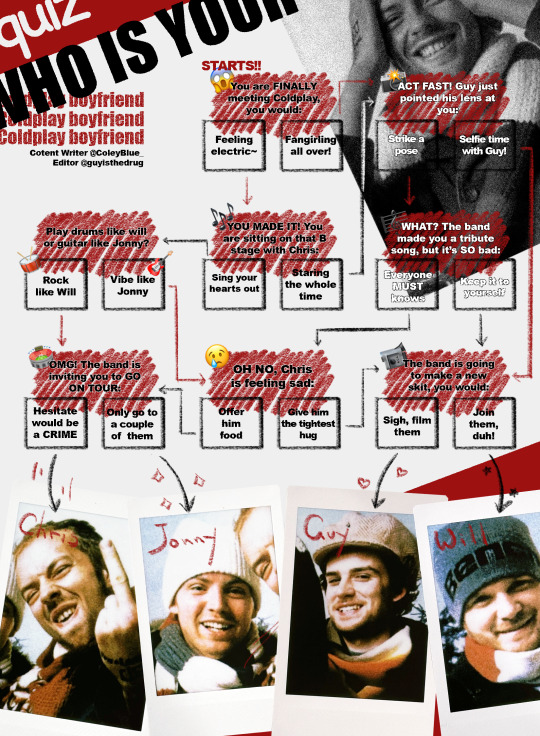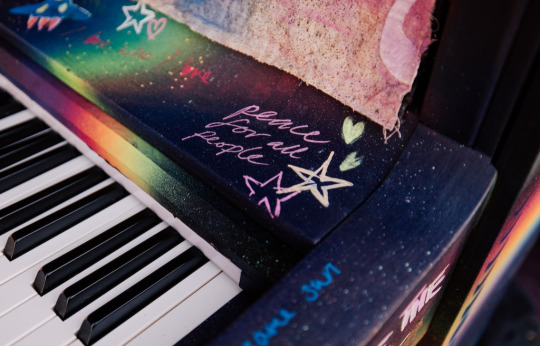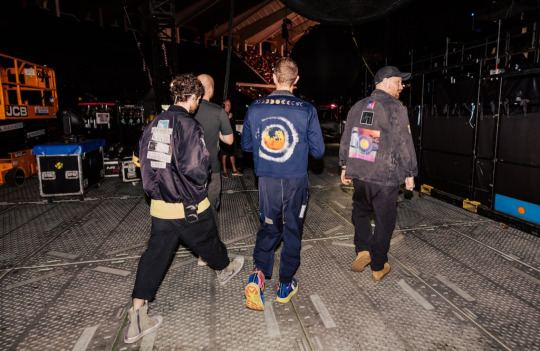#jonny buckland
Explore tagged Tumblr posts
Text




Coldplay - Fix You (Glastonbury 2024)
Bonus:

#coldplay#coldplay feels#chris martin#guy berryman#jonny buckland#will champion#Glastonbury 2024#Moon Music era#just squeeze my heart - it would've been less painful#i'm so proud of them#Coldplay feels gif#i'm so rusty
94 notes
·
View notes
Text




Watching a band (Coldplay) react to a crowd (reportedly 100,000, at Glastonbury) singing their song (Fix You) back to them is something I don't think I'll ever get tired of.
69 notes
·
View notes
Text
Coldplay is just four grown men + their ex manager that still sticks around just vibing around the world, trying to promote sustainable ways of making music while making poppy cheesy songs about love as a experience instead of a romantic feeling and tbh I just love them for that
#“one big band” indeed#my favorite band since I was a kid and I will love them til I die tbh#chris martin#will champion#jonny buckland#guy berryman#phil harvey#coldplay#flifil#moon music
65 notes
·
View notes
Text




Those Christmas lights Light up the street Down where the sea and city meet May all your troubles soon be gone Oh Christmas lights keep shining on
— Christmas Lights at the BBC Live Lounge 2013
19 notes
·
View notes
Text


Love🌙🤟
44 notes
·
View notes
Text


Hey, sweethearts! Ready to spice up your playlist and swoon over the dreamiest Coldplay heartthrob? Buckle up because we're diving into the ultimate love quest – "Who is Your Coldplay Boyfriend?" Slide into those cargo pants and prep your Nokia, 'cause this quiz is about to make your heart skip a beat💓💓
Imagine this: you, your BFFs, and the swoon-worthy lads of Coldplay hit the mall browsing through the latest fashion trends and squeeze yourselves into a tiny photo booth, strike poses, and come away with a strip of photos as a keepsake. Get ready to feel the butterfly flutters and the dial-up excitement! Dust off your glitter gel pens, channel your inner poet, and let's vibe with Chris Martin and the gang💁🏻♀️💁🏻♂️
The quiz is on standby, promising to spill the beans on which Coldplay cutie is about to rock your early 2000s world. Because, darling, love in the age of Y2K is a vibe of its own❤️🔥❤️🔥
65 notes
·
View notes
Text

Chris Martin and Jonny Buckland at Fuji Rock Festival on July 26th, 2003 - Coldplay [ROCKIN'ON (September 2003 - Fuji Rock & Summer Sonic Special Edition)]
Photographer: DYSK
#Chris Martin#Jonny Buckland#Coldplay#A Rush of Blood to the Head era#giant puppy#potato#my scan#ROCKIN'ON#ROCKIN'ON September 2003 - Fuji Rock & Summer Sonic Special Edition
7 notes
·
View notes
Text
Coldplay photographed by James Dimmock




72 notes
·
View notes
Text
#COLDPLAY: bumpin that
insp by my goat @comedyaoi
4 notes
·
View notes
Text

11 notes
·
View notes
Text

spotifyuk BTS of Coldplay getting ready to light up The sky tonight ✨
Coldplay headline The Pyramid @ 9.45pm
#coldplay#coldplay feels#guy berryman#chris martin#jonny buckland#will champion#Moon Music era#Glastonbury 2024
23 notes
·
View notes
Text
Here is a new series I want to make, idk what to call it, but the idea is I'm just going to share Coldplay Quotes that have been stuck in my head recently, whether they're really strange or they're actually quite normal!
Either I'm on the wrong algorithm, or I feel there isn't enough Coldplay content on the Internet anymore, so I want to contribute to bringing it back!
Aaaannyyyways, Coldplay Quote of the day, that's been stuck in my head recently:
"🎶And I'll take my *truck horn* and I'll vasectomise it-🎶" - Chris..
Link to video where I first saw it, all that time ago- 😭😅:
youtube
(Skip to 3:13 in the video)
Your welcome!
~ 🐏
#I've been singing this everywhere i go recently and its so odd out of context.#it got so bad that i had to show my brother the video because he wondered what i was singing about-#😭💀#“and this is the man you want to marry” he said#and i said “yes-”#help-#💀💀💀💀😭😭😭😭🤣🤣🤣🤣😅😅😅#coldplay#chris martin#jonny buckland#guy berryman#will champion#buckin coldplay#Youtube
2 notes
·
View notes
Text

¡Feliz Día de Reyes Magos! 👑👑👑👑
Queridos Reyes Magos: Quiero que me lo arrimen, no, quiero mirra 😁
#chris martin#guy berryman#jonny buckland#will champion#coldplay#reyes magos#feliz día de Reyes Magos#mexico#6 de enero#2025#lol#funny#Coldplay memes
2 notes
·
View notes
Text










Coldplay in Abu Dhabi, night two | 11.01.2025 | by Anna Lee via the Music of the Spheres World Tour app
15 notes
·
View notes
Text

old fanart
19 notes
·
View notes




